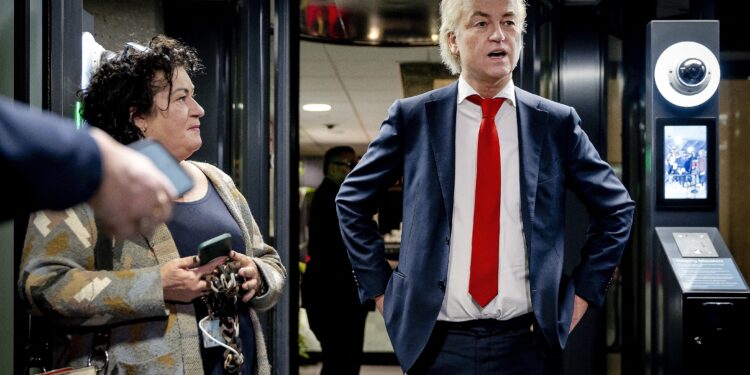Brussels – The already complex negotiations for the formation of a right-wing government in the Netherlands are increasingly uphill as they approach the third month since the most overwhelming elections of recent national history. After his triumph at the polls, the leader of the far-right anti-immigration, anti-Islamic, and strongly eurosceptic PVV (Party for Freedom), Geert Wilders needs to capitalize politically by putting himself at the head of a coalition of forces ranging from liberals to agrarian populists to, indeed, his extreme nationalist right, but the most recent developments in the negotiations between the
four main suspects do not indicate a downhill road to establishing this
solution. Especially after the decision of the leader of the centre-right New Social Contract party, Pieter Omtzigt, to walk away from the negotiating table after the unsuccessful confrontation on some of the points deemed most sensitive.

The door in Wilders’ face was slammed yesterday (Feb. 6) when Omtzigt made it known that he had withdrawn his party from the four-party talks on a government program and executive. Talks between the far-right PVV, the centre-right NSC, the liberals of the People’s Party for Freedom and Democracy (VVD)and the Farmer-Citizen Movement (Bbb) have been going on for more than two months, to secure a majority of at least 76 out of 150 seats in the Tweede Kamer (the lower house of the Dutch national parliament). In other words, convincing 39 more deputies to join the 37 newly elected nationalists to form a parliamentary majority to support Wilders’ cabinet (at the moment, only the agrarian populists of Bbb are willing to get in with their seven MPs). This is why not only the 24 liberal MPs from VVD are essential, but also the 20 from NSC, without whom a Wilders government would not have the necessary parliamentary support.
As reported by Dutch broadcaster Nos, Omtzigt explained to the party that he considered the talks to be over, particularly over unsolvable disagreements on financial and state budget issues. One of the biggest hurdles for talks between the far-right and centre-right parties concerned precisely how to deal with the state of the government’s finances: in the face of what Omtzigt calls “a more serious situation than expected,” Wilders assures low taxes and substantial cuts in public spending, but New Social Contract does not want to engage in “empty promises” to citizens. “Unbelievable as much as disappointing, the Netherlands wants this cabinet and Omtzigt throws in the towel while we were still in negotiations until today,” attacked on X the leader of the Dutch nationalist right. Among other unresolved issues still on the table is the crux of anti-Islamic and anti-EU policies proposed to voters by the PVV. Wilders not only wants to “ban” mosques, Korans and Islamic schools in the country and “expel” Dutch dual nationals who commit crimes but also to submit to citizens a referendum to leave the European Union (the so-called “Nexit,” from Netherlands plus exit).
At this point, the negotiator assigned by the PVV leader, Ronald Plasterk, is expected to draw up his final report on the negotiations this week and deliver it to the president of the Tweede Kamer, who may put on the agenda a debate about it and how to proceed. In fact, Omtzigt has not completely pulled the plug on a Wilders cabinet, since he still speculates on the possibility of supporting from the outside a minority government composed of the three remaining parties at the negotiating table, while the option of a “traditional” government with representatives of each party forming the parliamentary majority now seems to have been completely sunk. Another option could be that of an exploratory mandate to Frans Timmermans (former head for the European Green Deal in the EU Commission and head of the coalition between the Labor Party and the Green Left GroenLinks) with the two largest centre-right parties (a majority of 78 MPs would loom with also the liberals of D66). If no combination can be found to form a government, the last scenario is an early return to the polls.
What happened in the last election in the Netherlands
According to the official results of the Nov. 22, 2023 vote, the far-right PVV recorded the most convincing electoral test in its history, becoming the first force in Parliament and claiming the leadership of the Netherlands: with 23.5 per cent of the vote, it pulled 8 points ahead of the coalition between the Labor Party and the Green Left GroenLinks, led by Frans Timmermans. Despite the growth in votes (+4.7 per cent) compared to the last election in 2021 (when the two forces ran separately), the red-green coalition ended in second place with 25 seats, behind the PVV’s 37.
Third place for the centre-right of the People’s Party for Freedom and Democracy (which despite its name is not part of the European People’s Party family, but of the liberals of Renew Europe), with a 6.7 points drop and 10 fewer seats at the Tweede Kamer (from 34 to 24). Same fate for the liberals of Democraten 66 (from 24 to 9 seats) and the Christian Democrats of Christian Democratic Appeal (from 15 to 5). Exploit for the new centre-right New Social Contract formation, which placed fourth with 12.8 per cent and 20 seats. Also noteworthy was the advance of the Farmer-Citizen Movement, a populist party that advocates farmers’ interests, with 7 seats (+6 from last term).
English version by the Translation Service of Withub





